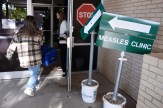Northeastern lifting its mask mandate Saturday

Northeastern will remove indoor mask requirements on its Boston campus, in accordance with new public health guidance. Face coverings will be optional in all settings beginning on Saturday, March 5, with the exception of University Health and Counseling Services.
This change in university policy comes as Boston health officials announced that they will lift the city’s indoor mask requirement for indoor places such as gyms, restaurants, museums, and entertainment venues on Saturday. The city will continue to require masks in Boston Public Schools, public transportation and healthcare settings.
Indoor mask mandates had already been lifted on many of Northeastern’s campuses, including in Nahant, Burlington, London, Portland, Charlotte, and the San Francisco Bay Area.
Last week, the U.S. Centers for Disease Control and Prevention issued revised recommendations for local jurisdictions to ease pandemic mitigation measures, such as masking and social distancing. Under the CDC’s new criteria, the metrics now indicate that less than a third of the U.S. population lives in a county where masks still should be worn in indoor public spaces. Federal public health officials also continue to mandate that people wear face coverings on public and private transportation services, such as trains, buses, planes, and Uber and Lyft vehicles.
Northeastern’s updated policy on masking emphasizes that face coverings are optional in indoor spaces, including residence halls, classrooms, dining halls, offices, fitness centers, and other campus buildings. This reflects a broader shift across the nation toward an individual and case-by-case approach to pandemic precautions.
“Northeastern has created this environment that has made us all feel pretty safe and be safe. This seems like the next step,” given that the community is fully vaccinated and boosted, says Mike Beaudet, professor of the practice of journalism at Northeastern. “Personally, yes, I’m ready to take my mask off. I think it’s going to take away a barrier in the classroom in terms of communication. It’s going to enhance learning and teaching.”
Giving people the option to go mask-less is a welcome breath of fresh air, says Henry Burtis, a fifth-year computer science major at Northeastern. “It’s a mark of a return to normalcy, so in that way it’s really good news,” says Burtis, who nonetheless says he plans to keep his mask on during classes and indoor exercise, at least for now.
Northeastern requires all members of the university community to be fully vaccinated and boosted against COVID-19.
That vaccine requirement makes a difference for fourth-year environmental engineering student Grace Pattarini. “In Boston, I think that [masks] are a good idea, considering you don’t know who is vaccinated and who isn’t,” she says. But because Northeastern community members are required to be boosted, Pattarini says, she supports Northeastern continuing to follow CDC guidance.
Under the CDC’s new guidelines, counties are classified into three “COVID-19 community level” categories according to hospitalization rates, hospital capacity, and new COVID-19 cases. Each category is given a specific set of recommended prevention strategies at both the individual and community levels.
Every county in Massachusetts is considered “low” or “medium” COVID-19 level under the new CDC guidelines. Neither category requires mask mandates in the CDC’s guidance. The CDC lists the risk level of every county in the country on its website.
Massachusetts’ Suffolk County, which includes Boston, falls in the “medium” category, which means that the CDC recommends an emphasis on access to tools such as vaccination, testing, and treatment, among others, particularly for high-risk people and those who have close social contact with them. As for masking, the CDC advises that individuals should talk to their healthcare provider if they are immunocompromised or at high risk for severe disease.
Although it was once thought that wearing a mask only protects others from your germs, scientists have since found that one-way masking does work to protect the wearer—even when interacting with someone who is unmasked. This is especially true if the person wearing a mask is wearing a high-quality, medical grade respirator, such as the N95 or KN95.
“From Day One of the pandemic, Northeastern has prioritized the health and safety of our community. In collaboration with university leaders and faculty experts, decisions have been informed by the latest data on covid transmission and public health guidance,” says Thomas Vicino, associate dean of graduate studies and professor of political science, public policy and urban affairs at Northeastern. “One of the lessons of the pandemic is that our new normal is shaped by a constant assessment of changing conditions and adapting to new protocols. Ultimately, this decision reflects our preparation to manage an endemic condition as we balance risk with the many intellectual and social interactions that our campus spaces provide us.”
Beaudet, the journalism professor, adds that, “We need to be respectful of people who have reservations. I think we need to respect that not everyone is going to feel comfortable with that.”
Sara Lourie, parent of a first-year student, is supportive of an end to indoor mask requirements. “The students need to see their professors and other students’ faces,” she says. “Socialization is necessary for their mental health. While there was a time and a place with previous variants, the current state should be mask-choice.”
The end of a mask requirement doesn’t mean that students plan on going mask-less all the time now. Pattarini, for example, plans to continue to wear a mask in crowded indoor spaces, particularly in situations where professors or classmates might be more vulnerable to severe disease. “I’m calculating for people around me,” she says.
Ethan Fasking, a fifth-year computer science and physics major, has asthma and feels that masking provides that extra level of protection.
“Even though cases are getting lower and the side effects are less severe, there is a chance for some pretty nasty long-term effects that I think are best left avoided, especially for the sake of our more vulnerable students and faculty,” says Fasking.
Hillary Chabot contributed reporting.
For media inquiries, please contact media@northeastern.edu.





